Archive for November, 2010
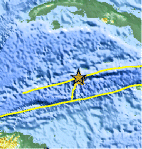
Earthquake shakes things up in early hours
 (CNS): A small earthquake measuring 4.7 on the Richter scale shook things up near the Cayman Islands early this morning. The quake occurred a little after 1:00am with an epicentre some 35 miles SSW of George Town, Grand Cayman (18.859°N, 81.588°W). The USGS earthquake centre stated that it occurred at a depth of around 6 miles. The Cayman Islands Hazard Management confirmed that there have been no reports of damage and the USGS said there was no tsunami threat. Although Cayman experiences quakes from time to time the last time the earth moved notably was in January when a number of sinkholes also appeared in the South Sound area.
(CNS): A small earthquake measuring 4.7 on the Richter scale shook things up near the Cayman Islands early this morning. The quake occurred a little after 1:00am with an epicentre some 35 miles SSW of George Town, Grand Cayman (18.859°N, 81.588°W). The USGS earthquake centre stated that it occurred at a depth of around 6 miles. The Cayman Islands Hazard Management confirmed that there have been no reports of damage and the USGS said there was no tsunami threat. Although Cayman experiences quakes from time to time the last time the earth moved notably was in January when a number of sinkholes also appeared in the South Sound area.

Farmers get new location to do business
 (CNS): Although Cayman imports nearly all of the food it consumes there are still a number of local farmers and food producers who are offering the public an alternative to imports with fresh local produce. Aside from the government sponsored weekend market at the Agricultural centre and the occasional guest appearance at Camana Bay finding outlets to sell their goods is a battle for many small producers. However, a new weekly market has now emerged on Godfrey Nixon Way, George Town. The Reflections Fresh Market started on 5 November and takes place beside the Reflections store every Friday from 3pm until 6:30pm.
(CNS): Although Cayman imports nearly all of the food it consumes there are still a number of local farmers and food producers who are offering the public an alternative to imports with fresh local produce. Aside from the government sponsored weekend market at the Agricultural centre and the occasional guest appearance at Camana Bay finding outlets to sell their goods is a battle for many small producers. However, a new weekly market has now emerged on Godfrey Nixon Way, George Town. The Reflections Fresh Market started on 5 November and takes place beside the Reflections store every Friday from 3pm until 6:30pm.
By supporting local farmers, the team at Reflections said they were promoting the benefits of buying local and eating fresh health food.As well as locally gown fruits and vegetables, locally prepared preserves and juices shoppers, fish and fritters shoppers can also find crafts and plants as well.
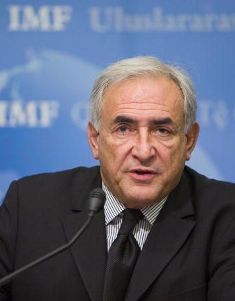
IMF wants more access to financial services data
 (Bloomberg): International Monetary Fund staff members said they need access to more data to determine the interconnection among financial institutions, as the fund seeks to help avoid a repeat of the global crisis. In a report released yesterday today, IMF staff said that about 20 key “large and complex financial institutions” can be identified as being at the centre of the global system. Still, there’s no “holistic” picture of their activities and of how funds flow across borders because of limited access to data on some issues, it said. “There are significant data gaps that preclude the completion of a comprehensive risk map — gaps that can only be bridged with buy-in from the membership on the value of such an exercise,” IMF economists said in the report.
(Bloomberg): International Monetary Fund staff members said they need access to more data to determine the interconnection among financial institutions, as the fund seeks to help avoid a repeat of the global crisis. In a report released yesterday today, IMF staff said that about 20 key “large and complex financial institutions” can be identified as being at the centre of the global system. Still, there’s no “holistic” picture of their activities and of how funds flow across borders because of limited access to data on some issues, it said. “There are significant data gaps that preclude the completion of a comprehensive risk map — gaps that can only be bridged with buy-in from the membership on the value of such an exercise,” IMF economists said in the report.
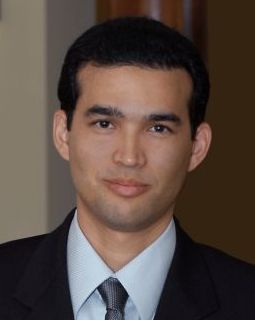
Investment bureau boss gets top ministry post
 (CNS): Government has now made the official announcement that Dr Dax Basdeo was appointed as Chief Officer, Financial Services, in the Ministry of Finance, Tourism and Development some time ago. A release from government said the deputy governor had appointed the head of the department of commerce and investment into this new post which he took up on 1 October. The post was created as a result of changes to ministry responsibilities resulting from the creation of a Minister of Finance under the new constitution. Twenty three persons applied for the job as part of an open recruitment process and four candidates were interviewed by a selection panel.
(CNS): Government has now made the official announcement that Dr Dax Basdeo was appointed as Chief Officer, Financial Services, in the Ministry of Finance, Tourism and Development some time ago. A release from government said the deputy governor had appointed the head of the department of commerce and investment into this new post which he took up on 1 October. The post was created as a result of changes to ministry responsibilities resulting from the creation of a Minister of Finance under the new constitution. Twenty three persons applied for the job as part of an open recruitment process and four candidates were interviewed by a selection panel.
Basdeo said of his new job, “I look forward to the challenges of this new position and the opportunity to continue to develop policies that will enhance the sustainable economic development of these islands.”
The panel which included Donovan Ebanks, the deputy governor was chaired by Senior civil servant Peter Gough, Nick Freeland from PricewaterhouseCoopers, Paul Byles and Kenneth Jefferson the financial secretary. “It is particularly pleasing to see a young Caymanian rising through the ranks to achieve one of the most senior positions in Government,” said Ebanks .
Basdeo holds a Bachelor of Science degree in finance and statistics from the Wharton School at the University of Pennsylvania, an MBA from the University of Manchester and a PhD in strategic management from the University of Maryland. A published author, Basdeo has also conducted research involving US businesses, with research teams at various academic institutions. He began his career in the civil service in 1995 as an economist. In 2004, he assumed responsibility for the Cayman Islands Investment Bureau (now the Department of Commerce & Investment) and devised policies and programmes supporting inward investment and economic diversification, small business development and provision of advisory services for international investors.
Basdeo currently has responsibility for a broad range of departments and authorities within the Ministry of Finance, covering such key areas as financial services policy, economic development and international relations. Specific functions under Dr Basdeo’s leadership include: the Department of Commerce & Investment; the Financial Services Secretariat; the Cayman Islands London Office; the General Registry, and; the Tax Information Authority.

Clearing the air
Please allow me the opportunity to clarify some points related to my tenure on the work permit board; recently there has been information put in the press that may have been misinterpreted. News outlets on the island should do more investigating before writing articles that paint the wrong picture.
I wish words like “conflicts of interest” wouldn’t be used so loosely in the public domain, leaving news articles open to interpretation by the reader is wrongand this style of journalism gives the general public the wrong impression and it’s the main reason I’ve decided to publicly clear the air on my departure from the work permits board.
It’s not my MO to point fingers and accuse and I won’t do it in this forum, but I would have hoped the government officials who reported I was no longer on the board would have used words less contentious when making this announcement – reasonable notice would have also been appreciated, I was advised of my departure on November 18, one (1) day before the news officially broke on November 19.
The conflict I was advised was that my attendance was being hindered by my fulltime job, I accepted that my other work commitments just didn’t allow me to continue to attend as before, so please don’t be misled with comments like “members not towing the line” & “certain individuals appointed not following the wishes of the administration”, we towed the line and like any new board we experienced numerous setbacks that didn’t allow us to do our work in the most efficient way.
Anyhow we managed to overcome those stumbling blocks and carried out the wishes of the Caymanian people to the best of our abilities collectively, in the process we created a new chapter. Our actions and the present internal changes in the work permits process speak volumes to our achievements.
Following the law as set out was our way of doing business, its unfortunate some of the public choose to draw conclusions based on a few lines written in the press, these comments are simply not the case and are far from the truth.
One local paper on Monday, November 22 suggested that the board "struggled to clear the backlog"; this again isn’t true as the board took “unprecedented steps” during my time there to clear the backlog which was in the thousands.
The new board has a strong foundation to stand on that hasn’t been seen in years and I hope and pray it continues to keep everyone accountable in immigration from the bottom straight to the top.
I will close now by saying to the people of the Cayman Islands, it was indeed a pleasure to have served over the last fifteen months, and my time on the board was a priceless experience.
It’s now my hope and I publicly challenge the new board to continue the fruitful works that has begun so immigration becomes a government institution we all can be proud of.
Law changed on old accounts
(CNS): Following the concerns raised by the financial services sector regarding the Dormant Accounts Law 2010 which government passed in July, amendments have now been made as a result of the issues raised by the sector. Government has now increased the dormancy period from 6 years to 7 years as well as the period of time which government will hold the funds in trust and has limited the scope of the type of financial institutions that will fall under the law as well as clarifying the notification requirements. Speaking in the Legislative Assembly this week the premier said the industry had made justifiable arguments for the changes as the law, designed to allow government to seize only abandoned cash was seen as too broad.
According to the industry the first version of the law captured instruments being used as part of long-term commercial transactions and experts argued that this was problematic for the trust industry. The original dormancy period of 6 years was also viewed as too short by international comparison.
The Financial Services Legislative Committee (FSLC) established a sub committee to work on changes to the law following the concerns raised by the finance sector stakeholders. As a result the new law now limits the scope of the financial institutions to only include Class ‘A’ insurers; Banks, credit unions and building societies; trust companies established specifically to deal with dormant accounts from banks that were closed; and any other type of financial institution which is declared relevant by the Cabinet.
The increase in the dormancy period by one year brings Cayman in line with the time frames of the Bahamas and the BVI. However, most European countries use a dormancy period of between 12 and 15 years and some industry players had asked for at least ten years.
The removal of the reference to the Limitations Law, and instead reference the Public Management and Finance Law (2010 Revision) now provides that monies transferred to government will be held in trust for an additional six years. Further clarity on the notification requirements that account providers will have to implement has also been given in the amended law.
“These amendments clarify several issues that would allow these institutions to be in compliance with the original intent of the law – the transfer of monies held in abandoned accounts to the government,” the premier said as he presented the amendments to the LA. He said the changes focus on the concept of abandoned property and provide for a more limited scope,minimising unintended consequences.
“It is unfortunate that several unanticipated difficulties arose in the initial law that was passed,” he added. “It was not as a result of lack of effort on the part of my ministry to ensure that private sector concerns were adequately addressed. We have been open and transparent in this process with the financial industry and will continue to do so to ensure the success of this industry.”
With greater clarity the premier said he believed investors, clients and international stakeholders would be assured as a result of the.
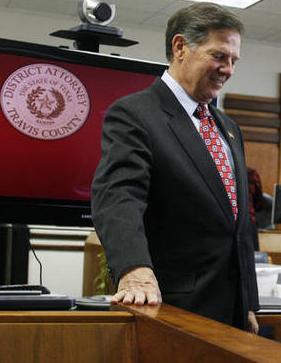
Former Republican guilty of money laundering
 (Reuters): A Texas jury found former Republican House Majority Leader Tom DeLay, dubbed "The Hammer" for his hard-driving style, guilty of money laundering and conspiracy on Wednesday. DeLay was accused of conspiring to illegally funnel $190,000 in corporate campaign donations to Republican candidates for the Texas Legislature in the 2002 elections."The public officials people elect to represent them must do so honestly and ethically and if not, they will be held accountable," said Travis County District Attorney Rosemary Lehmberg. DeLay, 63, faces five to 99 years in prison for the money- laundering conviction and two to 20 years for a conspiracy count as well, plus fines.
(Reuters): A Texas jury found former Republican House Majority Leader Tom DeLay, dubbed "The Hammer" for his hard-driving style, guilty of money laundering and conspiracy on Wednesday. DeLay was accused of conspiring to illegally funnel $190,000 in corporate campaign donations to Republican candidates for the Texas Legislature in the 2002 elections."The public officials people elect to represent them must do so honestly and ethically and if not, they will be held accountable," said Travis County District Attorney Rosemary Lehmberg. DeLay, 63, faces five to 99 years in prison for the money- laundering conviction and two to 20 years for a conspiracy count as well, plus fines.
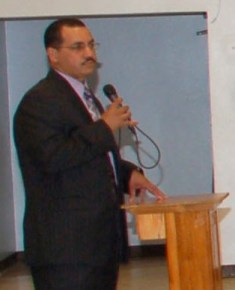
CI has employability problem
 (CNS): The Cayman Islands has a problem with employability and not unemployment, according to the labour minister. Speaking in the Legislative Assembly on Thursday afternoon, Rolston Anglin said that too many people lacked the necessary skills to get work and until government addressed that issue the country would never be able to tackle the problem of unemployment. He said that while there certainly were too many people who were employable currently out of work because of the economic circumstances, far more were simply unemployable. Promising more targeted programmes, he said his ministry was aiming to up the skill levels of the country’s work force.
(CNS): The Cayman Islands has a problem with employability and not unemployment, according to the labour minister. Speaking in the Legislative Assembly on Thursday afternoon, Rolston Anglin said that too many people lacked the necessary skills to get work and until government addressed that issue the country would never be able to tackle the problem of unemployment. He said that while there certainly were too many people who were employable currently out of work because of the economic circumstances, far more were simply unemployable. Promising more targeted programmes, he said his ministry was aiming to up the skill levels of the country’s work force.
“Cayman has an employability issue not an unemployment issue,” Anglin said. We have to be bluntly honest … andunless we address that we will never address unemployment.”
He said there was a need for what he called high impact training programmes that would deliver the skills to people that they needed to get jobs, and the ministry was investing some $200,000 to deliver the technology training at UCCI.
The minster warned that the programmes had to work, and while he was rolling out pilot projects, he wanted to make sure the courses would result in people getting the skills that the job market wanted.
Lauding the recent Passport2Success programme, which is currently focused on getting young people into the job market by giving them the necessary skills and tools to not only find a job but keep it, Anglin said there would be additional work placement schemes being rolled out over the coming months. The minster also spoke about the need to separate the labour and pension issues from human capital development, which would focus on this concept of making people employable.
“For too long we have been setting our people up for failure,” he told his legislative colleagues during the Strategic Policy Statement debate as he announced that his ministry was developing legislation to deal with the issue.
In the government’s SPS document unemployment figures are predicted to begin falling this year from the 2009 high of 6% to 5.8%, and with modest growth in the GDP it is expected to fall below 5% in 2011. For the period of this financial year 2010/11 the average rate is estimated to be around 5.4%.

Robber strikes at MoneyGram in George Town
 (CNS): Updated 8am Friday – Police officers have now confirmed that an armed robber struck at a local mini-mart last night (Thursday 25 November) in George Town. The MoneyGram store in at Meringue Town, Boilers Road, was targeted by a lone gunman. Armed with a handgun, he threatened staff and customers at the money transfer counter at around 7:40pm. After taking an undisclosed sum of cash, the robber made his escape on foot towards Walkers Road, witnesses said. Although there are no reports of injuries or shots being fired, police said the victims were badly shaken in the incident. (Photo courtesy of Cayman27)
(CNS): Updated 8am Friday – Police officers have now confirmed that an armed robber struck at a local mini-mart last night (Thursday 25 November) in George Town. The MoneyGram store in at Meringue Town, Boilers Road, was targeted by a lone gunman. Armed with a handgun, he threatened staff and customers at the money transfer counter at around 7:40pm. After taking an undisclosed sum of cash, the robber made his escape on foot towards Walkers Road, witnesses said. Although there are no reports of injuries or shots being fired, police said the victims were badly shaken in the incident. (Photo courtesy of Cayman27)
The offender is described as a young male, approximately 5 feet, 6 inches tall, wearing black long sleeve shirt, dark black gloves, blue jeans and black shoes. He spoke with a Caymanian accent.
A police spokesperson said, “This was a frightening and disturbing incident for the cashier, who was threatened with a handgun in order to obtain cash.” At this stage it is not being disclosed what monies were stolen, the police added.
Police are appealing for any witnesses or information to George Town CID on 949-4222 or Crime Stoppers on 800-8477(TIPS).
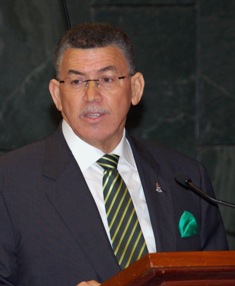
Mac talks fiscal prudence
 (CNS): The country’s premier said that fiscal prudence will continue to be the dominating factor in his administration as he delivered the government’s strategic policy statement on Thursday morning. Setting out the government’s broad policy objectives this annual statement is designed to set the scene for the 2010/11 budget. However, McKeeva Bush took the opportunity to also note what he said were real improvements in the current public finances. He announced that in the first quarter of the 2010/11 financial year government had achieved a surplus of approximately CI$15.4 million. In the budget it had expected a deficit of about CI$6 million but because of prudent action spending was much lower than expected.
(CNS): The country’s premier said that fiscal prudence will continue to be the dominating factor in his administration as he delivered the government’s strategic policy statement on Thursday morning. Setting out the government’s broad policy objectives this annual statement is designed to set the scene for the 2010/11 budget. However, McKeeva Bush took the opportunity to also note what he said were real improvements in the current public finances. He announced that in the first quarter of the 2010/11 financial year government had achieved a surplus of approximately CI$15.4 million. In the budget it had expected a deficit of about CI$6 million but because of prudent action spending was much lower than expected.
Aside from the various goals and ambitions of attracting new business to the islands and creating an attractive environment for investors, the premier focused on the need to put government’s financial house in order. He pointed to the much lower than expected deficit at the end of the 2009/10 financial year as a clear demonstration of his government’s success in that regard.
“In its first full year of office, my government has been able to reduce the unaudited budget deficit for the entire public sector to CI$15 million, for the year ended 30 June 2010,” he said. “This represents a whopping reduction of CI$66 million from the corresponding figure of CI$81 million for the year ended 30 June 2009.”
He said the improved results demonstrated that government was heading in the “right direction” the theme of his 2010 SPS. Bush said the opposition should judge government on the facts and without prejudice as the performance represented a CI$30 million improvement on the revised Budget Deficit which was made public in April this year.
With an overall improvement of $10 million inrevenue combined with a reduction in expenditure of$18 million less than the revised budget expectation as well as extraordinary expenses and statutory authorities losses both less than a million dollars than expected government had made a serious dent in the deficit.
“In simple terms, we have performed three times better than the revised budget expected,” Bush told the Legislative Assembly. “This is the kind of performance that will help us overcome the economic difficulties that we had to face left by the former government and we are giving ourselves the flexibility in our fiscal policy to take advantage of the prospects for economic improvement in 2011.”
He said that the first three months of this financial year — July to September 2010 government had continued on its track of prudent financial management with core public expenditures CI$18.5 million less than the budget anticipated. “This is not an accident; it did not happen by chance—it was the result of deliberate and prudent action by Ministries and Portfolios and by Honourable Ministers and Members of Cabinet,” the premier said.
In order to achieve economic growth, after overcoming the recession the plan was to focus on reform in the public sector; limits on new borrowings; the re-alignment of the existing revenue base; the reduction of operating expenditures and consideration of the use of PFI as an alternative source of funding – policy objectives that the premier has talked about since his election to office.
According to the policy statement document after the loan which government is still securing with Cohen and Company Ltd of $155 million the government will not take on any new borrowing as it believes there will be no more deficit budgets.
Bush said he that his government had the guts to put the country’s fiscal house in order. This he said would also send the right signals to stakeholders in the international centres such as Washington, New York and London to improve the situation for the financial industry. “This is part of our role in working hand in hand with the private sector to ensure our future prosperity,” Bush said.
He added that one of his main goals was to inspire the private sector as his government understood the best strategy for achieving sustainable growth in the local economy was to encourage the private sector to do what it does best — create wealth and generate jobs.
“As you may recall, the theme of my 2010/11 budget address was “Partnership for Recovery”, in which we suggested that there must be a new emphasis on the public/private sector partnership to drive the economic recovery,” Bush told the house.
He reemphasised the importance of the financial services industry which despite the economic downturn still accounted for around 40% of the government’s revenue and in the most recent study 60% of the employees are Caymanians.
From immigration policy changes to a new stimulus package the premier said he was still committed to the promise he made some two months ago.
“The Stimulus Implementation Group has compiled and filtered over 250 suggestions and initiatives submitted by numerous committees and associations. They are now in the process of prioritizing a list of measures which are targeted for implementation in the remainder of this fiscal year. At the end of the promised 90-days, I will be unveiling this stimulus programme, thereby charting the way through the recession and back on a path to economic prosperity,” Bush promised.
“It is important to demonstrate to our private sector partners, both local and international, that we are prepared to identify problems, prescribe solutions and oversee their implementation. In short, we will provide the leadership that sets this country on the right path, and given the evidence, the country has seen to date, we are heading in the right direction,” the premier declared.